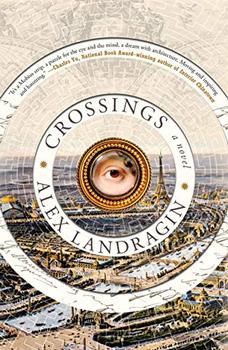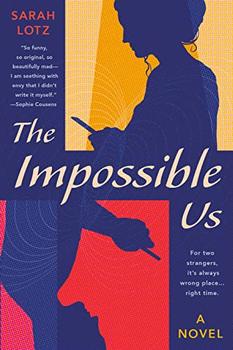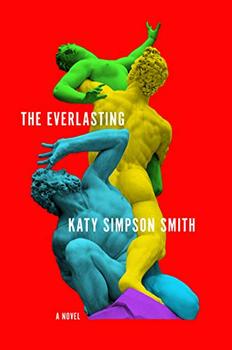Summary | Excerpt | Reading Guide | Reviews | Beyond the book | Read-Alikes | Genres & Themes | Author Bio

Crossings is a beautiful, if slightly messy, time-bending debut. It reads like a vampire novel, sans vampires. It zigs and zags like a classic "Choose-Your-Own-Adventure" book, but offers limited choices. The book is Francophile, while damning of French imperialism. It's compelling and confusing, interesting and sometimes extraneous. Never have I so thoroughly enjoyed a book while concurrently hoping the labyrinthine madness I was reading would come to an end.
The story begins, at least the way I read it, but more on that later, on a South Pacific Island. There are two friends, or lovers, we aren't sure, but they're definitely soulmates. On this island, the inhabitants can make "crossings" with each other; they can swap souls with another person by staring into their eyes for three to five minutes. However, there are rules about how it must be done. There are a limited number of crossings allowed per lifetime and a person must cross back into their own body.
And this is where the drama begins. As French colonialists land on the island in the late 1790s, a conflict ensues, and one of the soulmates, Koahu, is killed while in the middle of crossing with the would-be killer. The crossing is interrupted and incomplete. The other protagonist, Alula, witnesses this, and even though this soul is not supposed to cross again, it does so to pursue Koahu onto the French ship, as the other protagonist is now trapped in a French surgeon's body. It quickly becomes apparent that Koahu did indeed cross into the surgeon, but something went wrong. Shortly thereafter, the two souls are separated again. In sum, we have two protagonists – each a soul. Alula is aware of what has happened and in pursuit of her soul mate, while Koahu is completely oblivious.
That's the beginning. Fast-forward roughly 150 years and through 11 more bodies, and you finally get a resolution to this unique, well crafted lovers' quandary. This includes a return visit to the island and the addition of a third, vengeful soul that shakes things up along the way.
As if the plot were not complex enough, the book forces upon the reader an unexpected dilemma after the preface — a choice that will impact how the book is interpreted. Without spoiling too much, the reader must decide whether to read the book straight through — as three back-to-back novellas — or in a prescribed manner with chapters interspersed from all three novellas in a predetermined order chosen by the author. Presumably, these would be two very different reading experiences.
I chose the non-sequential path. I imagined it would be a more unique and interesting read. Approximately halfway through the book, I regretted my decision. Not knowing how many pages were left in the story, nor how far I had already read, made the undertaking a bit tortuous. I kept thinking the plot was wrapping up, only to suddenly be thrust backward 100 years to a new soul or character. This was often disorienting.
Yet, I couldn't put the book down. Landragin's prose is gorgeous. Crossings is written as an epic but succeeds where many lesser books have failed — it never gets buried under the weight of its own history. Intricate description and detail make it feel more like a documentary at times than a novel, particularly in its evocation of 1800s Paris, and the acute character focus helps move the plot forward.
The problem with body-hopping over the course of 200 years is that one ends up with a lot of "main" characters. Every time a protagonist crosses into a new character, s/he picks up their memories and personal histories as well, while maintaining the previously acquired memories of other bodies. Eventually, you have a main character with so many personalities, body traits, genders and memories, you cannot recall all of the previous people comprising the current one. Given the non-linear nature of the way I read it, I also had trouble remembering if the soul had already possessed a certain character yet.
Is this beautiful mess worth it?
Surely, Landragin's creativity and sheer tenacity in pulling off such a cunning plot device — albeit, a one-trick pony — and such impressive description is to be applauded. It's a beautiful and insanely detailed book, and the plot device is solid. If you enjoy mystical, history-spanning books that largely take place in France or in French colonies, you will probably love it. If you like epic storytelling, Crossings has this factor covered. If you're looking for a book with deeper meaning and takeaways beyond the theme of eternal love, it's probably best to pick something else.
Dreaming up and writing this novel was surely no small feat. Wading through it, non-linearly at least, was at times difficult as well. In my opinion, it was well worth the journey. A second reading following the linear perspective would surely bring the story into even more focus, but with so many good books to read, I question how many will find doing so worthwhile. Yet, this does mean the book leaves a lasting impression: I will always wonder how the story plays out differently when read the other way. Perhaps this in turn will make the book nearly immortal, like its characters, in my memory, as I ponder what might have been had I chosen differently.
![]() This review was originally published in The BookBrowse Review in August 2020, and has been updated for the
November 2021 edition.
Click here to go to this issue.
This review was originally published in The BookBrowse Review in August 2020, and has been updated for the
November 2021 edition.
Click here to go to this issue.

If you liked Crossings, try these:

by Sarah Lotz
Published 2022
In this funny and poignant novel, two strangers learn that their soul mate might be both as close as breath and as distant as a star, from British Fantasy Award recipient Sarah Lotz.

by Katy Simpson Smith
Published 2021
From a supremely talented author comes this brilliant and inventive novel, set in Rome in four different centuries, that explores love in all its various incarnations and ponders elemental questions of good and evil, obedience and free will that connect four unforgettable lives.
Your guide toexceptional books
BookBrowse seeks out and recommends the best in contemporary fiction and nonfiction—books that not only engage and entertain but also deepen our understanding of ourselves and the world around us.